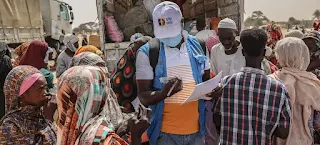According to an alert from the UN refugee agency (UNHCR) on Tuesday, the number of Sudanese refugees in Chad has more than tripled in just over two years due to the ongoing conflict in their home country. Currently, approximately 1.2 million Sudanese individuals have sought refuge in eastern Chad, primarily escaping escalating violence. Since the outbreak of war in Sudan in April 2023, over 844,000 people have crossed the border. Before this surge, Chad was already hosting around 409,000 Sudanese refugees who had fled previous conflicts in Darfur.
"A Crisis of Humanity"
The situation has been described as "a crisis of humanity" by Dossou Patrice Ahouansou, the UNHCR’s Principal Situation Coordinator in Chad.
The latest wave of displacement began in April, triggered by attacks from armed groups in North Darfur. Violence has escalated since the outbreak of war in Sudan in April 2023, involving the Sudanese Armed Forces (SAF) and the paramilitary Rapid Support Forces (RSF).
Camps housing those displaced by the recent violence, such as Zamzam and Abu Shouk, as well as the town of El Fasher, have come under attack, resulting in the deaths of over 300 civilians.
Last Thursday, the UN World Food Programme’s facility in El Fasher was subjected to repeated shelling, as reported by the UN aid coordination office, OCHA.
The following day, Eldaman International Hospital in Al Obeid was hit by a drone strike, which killed at least six health workers and injured more than 15 others. Both attacks were reportedly carried out by the RSF.
Exodus and Arrival
In just over a month, 68,556 refugees have entered Chad’s Wadi Fira and Ennedi Est provinces, averaging 1,400 new arrivals each day. According to Mr. Ahouansou, more than 70% of these individuals report experiencing serious human rights violations, including physical and sexual violence, arbitrary detention, and forced recruitment. Based on interviews with 6,810 newly arrived refugees, he noted that 60% have been separated from their family members.
Horrific Testimonies
Mr. Ahouansou shared the story of seven-year-old Hawa, whose home in Zamzam was destroyed by a bombing. After her mother was killed, she sought refuge in the Zamzam camp for internally displaced people. Unfortunately, the camp was also bombed, resulting in the deaths of Hawa’s father and two brothers. With only her 18-year-old sister left, Hawa managed to escape to Chad, but she suffered severe injuries that required the amputation of her leg.
“It’s hard to accept, but this is the reality,” stated Mr. Ahouansou, highlighting that thousands are enduring similar hardships. The UNHCR official also shared harrowing accounts of forced labor during these treacherous journeys, where many reportedly perish due to extreme heat and water scarcity. “When armed groups see you leaving, they choose to let the donkey or horse go. But you, as a human being, as a man... they will make you carry the burden of your entire family,” he explained.
Funding Shortfalls
Despite the efforts of humanitarian organizations and local authorities, the emergency response is critically underfunded. Only 14 percent of shelter needs have been addressed, and refugees are receiving just five liters of water per person each day—well below the international standard of 15 to 20 liters. Approximately 239,000 refugees remain stranded at the border.
“The lives and futures of millions of innocent civilians are at stake,” stated UNHCR spokesperson Eujin Byun, emphasizing that this is also a “crisis affecting women and children,” who represent up to 90% of the refugees crossing the border. “Without a substantial increase in funding, we cannot provide life-saving assistance at the necessary scale and speed,” Mr. Ahouansou added.



